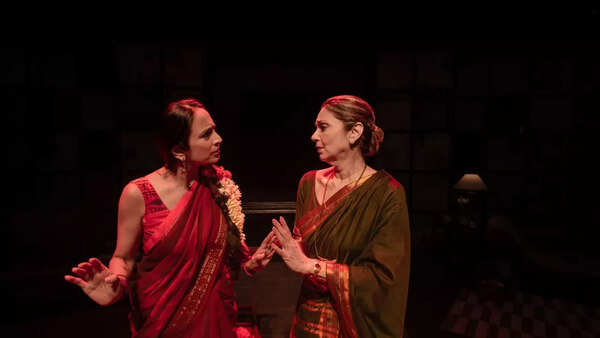- News
- entertainment
- Theatre allows you to experience and process emotions: Lillete Dubey
Trending
Theatre allows you to experience and process emotions: Lillete Dubey
Lillete Dubey, with over five decades in theatre, highlights the power of live performances and their distinct challenges. She believes theatre allows actors to truly live their roles. Lillete also mentions the growing engagement in theatre and reveals her excitement about directing Mahesh Elkunchwar's play 'Autobiography' in Pune on April 6.
“For an actor, theatre is the real test,” says Lillete Dubey, who has spent over five decades directing, producing, and acting in the theatre space. A firm believer that stage remains an actor’s true domain, Lillette shares, "There’s a well-known saying that theatre is an actor’s medium, while film and OTT belong to the director. There are no second takes (in theatre).” In a conversation with us, the actor reflects on the power of live performances, and the evolving theatre landscape, and shares her excitement over bringing a respected writer’s work to the city.
“On stage, you own the space”
It’s the immediacy and unpredictability of live theatre that makes the experience exhilarating yet demanding for Lillete. “You can’t rely on dubbing to fix weak voice projection, and if something goes wrong, there’s no correcting it in post-production,” she explains. Lillete believes it’s the shared energy between the actor and audience that truly sets theatre apart. “In theatre, the audience is as much a part of the performance as the actors. In a film, a director has a vision of the whole, but as an actor, you often perform your scenes without seeing the rest of the film,” adds Lillete. But the actor-director-producer does acknowledge the reach that films bring to the table. Recalling how one of her early films gave her instant recognition in a way that decades of theatre couldn’t, Lillete shares, “More people saw me in one weekend of my film’s release than in all my years on stage. Even a play like Dance Like a Man, which is nearing 700 shows, can’t match that reach. The reach of film is very different from the reach of theatre.”
“You don’t just act a role, you become it”
For the multi-hyphenate, the essence of acting lies in fully inhabiting a character. “Barry John, my mentor, always said that you don’t just act a role, you become the character,” she explains. Some roles, she admits, are emotionally draining, but they offer a unique kind of catharsis. “When you take on a character who has gone through deep grief, loss, or betrayal, somewhere you’re also releasing those feelings within yourself. You’re not just acting, you’re living that character.” After these many years, the actor-director has learned how to come back to herself once a performance is over. “When you’ve played something heavy or deeply emotional, it takes a little time. That’s the beauty of theatre, it allows you to experience and process emotions in a way that is both personal and shared with the audience,” she says. Stressing on the fact that there needs to be more venues, Lillete points out, “If we had more spaces, there would be even more theatre happening. We don’t have enough venues for the demand,” However, she attributes the growth of engagement to factors including smaller, experimental spaces and the increasing number of theatre festivals. “Younger kids are finding all kinds of venues, small spaces, clubs, and whatever they can get because they have a strong desire to do theatre.”
When you take on a character who has gone through deep grief, loss, or betrayal, somewhere you’re also releasing those feelings within yourself. You’re not just acting, you’re living that character
Lillete Dubey
“Pune is home to Marathi theatre”
Lillete is excited about bringing a play written by the acclaimed playwright, Mahesh Elkunchwar, to Pune on April 6. Titled Autobiography, the play will be directed by Lillete. “Pune is home to Marathi theatre, and we are bringing a play by a playwright, who is deeply respected. It has a terrific cast and an interesting script about human relationships,” shares Lillete.

Lillete Dubey and Suchitra Pillai in a still from the play Autobiography
End of Article
Follow Us On Social Media
Visual Stories
Tired of too many ads?go ad free now









